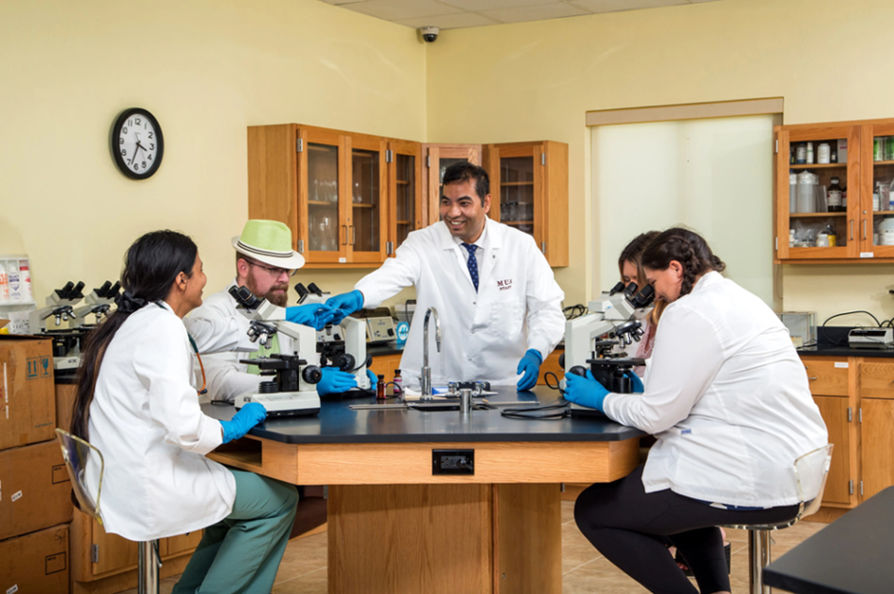
How to Succeed in Medical School
This comprehensive guide offers helpful advice and strategies designed to help you excel in medical school.
It is no secret that succeeding in medical school is a challenging (but incredibly rewarding) endeavor. It takes a lot of hard work, dedication and time management skills to make it through.
In this blog, we will discuss some important things to keep in mind when going through medical school, from establishing good study habits to using the support you have available.
So, if you’re wondering how to be a successful medical student, just follow these tips and you’ll be well on your way to an MD degree and a successful career in medicine.
1. Learn How to Study
One of the most important things you can do is to learn how to study in medical school efficiently. You will have a lot of coursework and material to get through, and it is important to be able to focus your studying so that you can retain as much information as possible.
2. Create a Study Schedule
One way to do this is to create a study schedule and stick to it. Set aside regular time slots during the week to review your coursework and study for exams. And make sure to give yourself breaks! It is important to stay fresh so that you can focus when you are studying. While it may seem there’s no time to take a break, it will help you in the long run, as your brain will be able to absorb information more effectively if you take some time to refresh and relax.
Invest some time in researching a study schedule for medical students, as there are many different techniques out there and one may be perfect for your own style and needs.
3. Time Management
You will need to learn how to manage your time effectively. Time management is key in medical school, as you will need to balance your studies with your class and lab time, clinical rotations, extracurricular activities and research opportunities. Make sure to set aside enough time for each of these areas, and don’t forget to schedule some downtime for yourself.
4. Try Different Study Methods
It’s a good idea to try different methods of studying until you find what works best for you. Some people prefer to study in groups, while others like to study alone. Some people like to make flashcards, while others prefer to read over their notes multiple times. Find what works for you and stick with it.
5. Study Resources and Tools
Utilizing the right study resources and tools can make a significant difference in how efficiently you absorb complex medical concepts. Flashcard apps like Anki and Quizlet help reinforce learning through active recall, while digital note-taking tools ensure you can organise key information effectively. Reliable online platforms, such as the MSD Manual, provide up-to-date medical knowledge at your fingertips. Additionally, taking advantage of free resources for medical students can supplement your studies without adding extra costs. These resources can help you to effectively remember what you learn in medical school.
6. Take Care of Yourself
Don’t forget to take care of yourself! It is important to eat healthy and exercise, as this will help you stay focused and energized throughout the day. Making time for self-care and taking breaks is important and will keep you from getting too stressed.
7. Support Opportunities
One of the best things about medical school is that you will be surrounded by people who are going through the same thing as you. Your classmates and friends can be a great resource to lean on. You can help each other study, offer support and provide motivation. Your family and friends are also great resources; they can help you through the tough times and be there to celebrate your successes.
Make sure to use your professors as a resource as well. They want you to succeed and are usually more than happy to help you out. So if you are struggling with a concept or topic, don’t be afraid to schedule a meeting and ask for help. During clinical rotations, get to know the nurses and other staff members. They can be a great resource for information and help with your work. Their wealth of knowledge and experience in the field is invaluable. Find out more on how to study during clinical rotations to make the most of your time during this critical part of your studies.
Finally, take advantage of the health and wellness resources available on campus!
8. Find a Mentor
One of the best things you can do is to find a mentor. A mentor is someone who has been through medical school and can offer guidance, support and advice. They can help you navigate challenges and give you an insider’s perspective on what to expect next. Having a mentor can also help you learn about the essential qualities of a good physician, as they can share their own experiences with you.
If you don’t have a mentor, there are several ways to find one. You can reach out to your professors, look for a mentor program through your school or the American Medical Association, or even ask family and friends if they know someone who would be willing to help you. You can also join professional organizations or attend conferences, as this will allow you to meet potential mentors.
Once you have found a mentor, ask them about their journey, study tips for medical students, what they wish they had known as a student and what advice they may have. Be sure keep in touch with them after you graduate — they’ll be delighted to hear about your successes and offer advice as you begin your career.
Then, when your time comes, don’t forget to pay it forward by mentoring someone else if the opportunity arises!
9. Ask for Help
Medical school can be tough, and there will be times when you need help. Whether you are struggling with a concept or feeling overwhelmed by your workload, don’t hesitate to reach out for help. There are many people who want to see you succeed and are more than happy to support you.
If you’re in need of academic help, there are many resources available. Ask your classmates or friends for help, reach out to your professors, connect with teaching assistants or hire a tutor. If you’re struggling with the workload, speak to your clinical supervisor, your school’s Student Affairs office or other student support services. They may be able to offer advice for medical students on time management or provide other resources to help you.
Remember, there is no shame in asking for help. It takes courage to admit when you need assistance, and doing so can only make you stronger. Don’t be afraid to source some help when you need it — it could be the key to your success in medical school.
10. Self Care
Medical school is tough and many students even wonder if you get breaks in medical school. You do, and it’s important to take advantage of them to rest and relax. When you have time, be sure to take care of your physical and mental health by scheduling time for activities you enjoy. This will help you stay motivated and prevent burnout.
It’s important to allocate time for exercise, hobbies and socializing. Join a sports team, take up a new hobby or go out with friends. It may seem like there’s no time for anything else when you’re studying, but it’s important to take a break now and then.
It’s also important to remember that everyone copes with stress differently. Find what works for you and stick to it. Whether it’s going for a run, reading some fiction or spending time with friends and family, take time for activities that help you relax and recharge.
Conclusion
Medical school is a demanding experience but it can be immensely rewarding. Don’t forget to ask for help when you need it, find a mentor to guide you and make time for yourself. With these tips, you’ll develop some of the habits of successful medical students and be on your way to a successful career in medicine.
For those still planning their journey to medical school, be sure to consider the Medical University of the Americas MD program, which is designed to help you achieve academic, personal and career success as a practicing physician!
Learn more about the MUA student experience by exploring our website or viewing this video testimonial:
If you have any questions about our programs or our admissions requirements, please contact us or join one of our events.
Frequently Asked Questions
Many students find the second year the most challenging due to the intense coursework and preparation for the USMLE Step 1. This period asks students to master large amounts of information while also developing critical clinical reasoning skills. This intensive workload is one of the main reasons why medical school is so hard. However, the difficulty varies for each student, depending on their strengths, study habits and adaptability.
Active recall and spaced repetition are widely regarded as the most effective study methods for medical students. Tools like Anki and Quizlet help reinforce key concepts, while practice questions and case-based learning deepen understanding. Combining these techniques with consistent reviews of the material helps ensure better long-term retention.
Medical students rely on memory techniques like spaced repetition, mnemonics and visual aids to retain vast amounts of information. Flashcards, diagrams and storytelling methods help reinforce complex topics in an engaging way. Consistent review and application in clinical settings further solidify their knowledge.
Success rates vary by institution, but MUA is proud that our students have achieved a 98% residency placement rate over the past four years (2020-2024), as well as strong USMLE first-time pass rates. These metrics speak to their own dedication, as well as the individualized support and comprehensive medical education they receive in our MD program.



